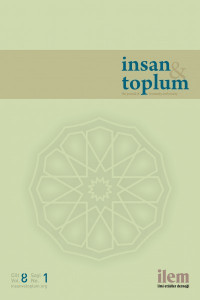Abstract
Bu çalışma, Raşid Gannuşi’nin siyasetin doğasına dair temel varsayımlarını sorgulamayı amaçlamaktadır. Gannuşi’nin siyaset tasavvurunun birinci varsayımı, siyaset ile devleti özdeş kabul etmesi, sosyal/sivil alanı siyasetten berî bir “hizmet” alanı olarak görmesidir. İkinci olarak Gannuşi, devleti nötr, ideolojik mücadele ve çatışmalardan berî bir alan olarak görmektedir. Üçüncü olarak ise Gannuşi farklı siyasal kimliklerin ve taleplerin nihayetinde uzlaşabileceğini, dolayısıyla aralarındaki farklılıkların arızi ve geçici olduğunu iddia etmektedir. Gannuşi’nin siyasete dair verili kabul ettiği bu üç temel yaklaşım siyasal kavramından hareketle tartışılmaktadır. Gannuşi bu çalışmada, Nahda ve Tunus İslami hareketinin önemli bir aktörü ve lideri özelinde tartışılmamakta, genel olarak İslamcılığın tarihsel süreçteki gelişimi ve deneyimleri üzerine düşünen ve de İslamcılık ve İslami hareketler bağlamında etkili ve fikrine başvurulan bir kanaat önderi olarak ele alınmaktadır.
References
- al-Ghannoushi, R. (2010). Islamic Movements: Self-Criticism and Reconsideration. M. Abu-Rabi’ (Ed.), The Contemporary Arab Reader on Political Islam içinde (s. 130–134). London : Edmonton: Pluto Press.
- el-Gannuşi, R. (2010). Laiklik ve Sivil Toplum. İstanbul: Mana Yayınları.
- Ghannouchi, R. (2013). The state and religion in the fundamentals of Islam and contemporary interpretation. Contemporary Arab Affairs, 6(2), 164–171. https://doi.org/10.1080/17550912.2013.783184.
Abstract
This article aims to examine Rachid al-Ghannoushi’s fundamental assumptions on the nature of politics. The first assumption of Ghannoushi’s political imagination is that he reduces politics to the state and a spesicif institutional ensemble and sees social/civil field as merely social service by exempting it from politics. Secondly, Ghannoushi envisions the state to be a neutral mechanism far from ideological struggles and conflicts. Thirdly, Ghannoushi claims that different politicial identities and demands comes to a consensual point of view at the end of the day, the differences among them are transitory and insignificant. Ghannoushi’s three given assumptions on the nature of politics are analysed through the notion of political. In this study, Ghannoushi is not discussed in the context of Nahda and the Islamic Movement in Tunusia where he is a pioneering figure and leader, but he is examined as a thinker on the development and experiences of Islamism and as an effective opinion leader being referred to on Islamism and Islamic Movements.
References
- al-Ghannoushi, R. (2010). Islamic Movements: Self-Criticism and Reconsideration. M. Abu-Rabi’ (Ed.), The Contemporary Arab Reader on Political Islam içinde (s. 130–134). London : Edmonton: Pluto Press.
- el-Gannuşi, R. (2010). Laiklik ve Sivil Toplum. İstanbul: Mana Yayınları.
- Ghannouchi, R. (2013). The state and religion in the fundamentals of Islam and contemporary interpretation. Contemporary Arab Affairs, 6(2), 164–171. https://doi.org/10.1080/17550912.2013.783184.
Details
| Primary Language | Turkish |
|---|---|
| Subjects | Philosophy, Political Science |
| Journal Section | Research Articles |
| Authors | |
| Publication Date | March 15, 2018 |
| Published in Issue | Year 2018 Volume: 8 Issue: 1 |


